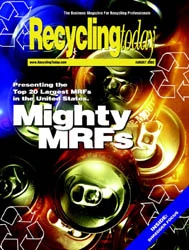Many recycling advocates are convinced they have strong, influential enemies who oppose the very concept of recycling. There are indeed instances when recycling initiatives are opposed, or when legislation or regulations with a harmful effect on recycling seem to have suspicious origins in the mining, timber or solid waste industries.

Recyclers of construction and demolition debris have recently seen a number of initiatives that threaten some of their processing techniques and end markets, and it may take some rallying on that industry segment’s part to fend off or reverse some of these dubious proposals. Recyclers who believe container deposit and return systems—bottle bills—offer the most efficient way to capture the largest percentage of beverage containers for recycling are familiar with what well-funded opposition can do to stall a proposed bill.
Certainly, recyclers have a current and prospective need to be represented in the lobbying game and to make sure their economic interests are not trampled. Being alert to legislation that can bring harm to one’s industry is certainly not unique to recycling. But for recyclers, focusing inordinately on enemy subterfuge may be missing a wider point. Increasingly, it seems that overall economic conditions are having the greatest effect on whether recycling prospers or struggles.
As has been noted in this column before, recyclers in many geographic regions see each subsequent recession taking away both industrial scrap generators and consuming mills. For the past four years, recyclers saw many scrap-consuming steel mills, nonferrous smelters and paper mills shut down (or move offshore), perhaps permanently.
Similarly, a number of scrap generation sources closed their doors permanently during the most recent economic downturn. The commercial printing industry has consolidated—resulting in plant closings—but also has seen a lot of production move offshore, with cuttings and trimmings now out of reach of U.S. paper packers. Metals fabricators were also punished by the recent downturn.
And when the economy was booming, capital was pouring into technology companies (not so wisely in many cases, it turned out), while manufacturers and those in the basic industries sectors were ignored by bankers or considered risky enterprises in danger of being left behind by the vaunted "new economy."
But manufacturing—whether in the U.S. or offshore—will always be part of the economy, and so will the scrap manufacturers generate. Increasingly, manufacturers are aware that this scrap has value, and they are also looking for alternatives to being charged by solid waste companies for the disposal of residues.
Sauder Woodworking Co., Archbold, Ohio, creates some 300 tons of sawdust each day at its northwest Ohio plants. Rather than being charged for landfilling it, the company has sold some material to farmers for animal bedding while using the majority of it in an electrical co-generation plant that produces enough electricity annually to power nearly 4,000 homes.
Sawdust is not yet a traded commodity like scrap steel or cardboard, but the initiation of such efforts demonstrates that manufacturers are not married to the concept of throwing waste into a landfill if better alternatives are offered.
If recycling advocates are seeking something to worry about, the greater threat may be the ultimate "co-opting" of recycling by established generators, consumers of scrap materials and even solid waste companies, much in the manner rock music is perceived by some to have been sold out to Madison Avenue for use as advertising jingles.
If that’s the case, the new boss may or may not be the same as the old boss, but the recycling beat will go on.

Explore the August 2002 Issue
Check out more from this issue and find your next story to read.
Latest from Recycling Today
- Athens Services terminates contract with San Marino, California
- Partners develop specialty response vehicles for LIB fires
- Sonoco cites OCC shortage for price hike in Europe
- British Steel mill’s future up in the air
- Tomra applies GAINnext AI technology to upgrade wrought aluminum scrap
- Redwood Materials partners with Isuzu Commercial Truck
- The push for more supply
- ReMA PSI Chapter adds 7 members





